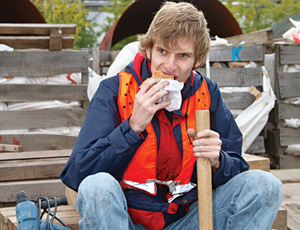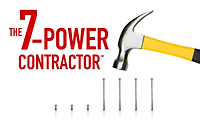
Many office people order in and gulp down their food while they’re busy trying to handle the phones, computers and more. There’s an invisible ball and chain that attaches them to their desks. If they dare go out to lunch, they’re scorned by their co-workers for abandoning their post and leaving them in their hour of need.
What’s worse? Skipping lunch altogether.
How do I know? I use to do it all the time when I was a contractor and would bounce between the field and the office, depending on the place where I felt I was needed most.
All this rushing in meals and skipping breaks made me feel more productive but it didn’t help my weight. I was 40 pounds heavier than I should have been and my knees and back still feel the pain today. The reason is simple. When I skipped meals — especially late at night when I was running calls — I would finally stop to eat. And then I was ravenous and I felt I’d earned the right to eat everything that wasn’t nailed down. Did I mention how good the food is at a greasy diner in the middle of the night in NYC?
Fortunately, a smart mentor of mine schooled me about the need to stop and take short breaks throughout the day. Even if it was just for 30 minutes to recharge my batteries and to shake off what had transpired in my day so far.
The funny thing is when I got disciplined about this good habit, I was actually more effective and more productive than when I’d either wolf down my lunch or skip it altogether.
Ditch the rocks
The fact is we all need time to shake things off and reset. The analogy I share in workshop is that all of us can pick up a stone and put it in our pocket and walk a block. Try doing that when you’re stopping to pick up a rock and you’re walking 26 miles, like a marathon. Our days are typically marathons and by the end of the day we’re loaded down with every rock we’ve accumulated throughout the day.
What kind of rocks am I talking about?
How about a few of these rocks:
• Some techs called in sick.
• Someone got hurt on the job.
• We’re overbooked and customers are screaming.
• There are traffic jams all over the place holding us up.
• The computer just went down.
• Customers are on hold too long.
• Our bookkeeper just let me know he’ll be leaving at the end of the day for a new job.
• Someone just got into an accident with our newest truck.
• Customers are on the phone complaining about the price they were charged.
• The parts that were promised to be delivered last week will be delayed until next week.
Shall I go on?
Here’s what I know. Dispatchers and customer service representatives are on the front line for abuse from customers and technicians. And on a bad day they’re getting grief from their superiors, too. These are stressful jobs. Chaining them to the desk — even if they say they don’t mind — is a bad thing. The best thing is to have them cross-trained so they can cover for one another. That way they can take a 15-minute break mid-morning, get at least 30 minutes away from their desk for lunch and take another 15-minute break mid-afternoon.
A friendly experiment
One day, I was talking to a good friend, who just happens to be one of my best customers as well. He has what I believe is probably the most stressful job ever. He is a real estate manager who represents a bunch of condominiums in the greater New York City area. He has about 500 bosses, one of whom called him at 2 a.m. to report that the garage door to the condo was closing too slowly. That’s right. The problem wasn’t that the garage door wasn’t closing or opening, it was just closing too slowly. Go figure someone from NYC being picky.
One day we met up at a condo that my company served. I suggested we stop for lunch.
At first, he resisted the idea: “I’m way too busy, so I never stop for lunch. My day already ends at 9 p.m. or later.”
I replied: “So what if you get home at 9:30 p.m. or later by taking a 30-minute lunch break? Are you up for an experiment? I want you to take a 30-minute lunch break every day for a whole week and then I want you to let me know how it goes.”
He called me up one week later as promised. “I can’t believe it. I’ve been taking a 30-minute lunch now all week and so far I’m getting home around 8 p.m. What’s even more surprising is I’m so much more productive at work and a whole lot less cranky when clients call. How can that be?”
I laughed and responded: “That’s because you’re feeding your brain as well as your body when you take a time out. Plus, taking a break is allowing you to shake off the mounting stress from the morning, which then puts you in better shape to handle the rest of the day. What you used to do was carry what I call ‘rocks,’ which is stress. Lunch was a perfect time to empty your pockets!”
Here’s what I promise you: Your entire team will be more productive and better able to serve customers and the company if they take more breaks. The reason I can promise you that is because every shop where we have implemented this practice reports an increase in customer satisfaction and in staff morale.
Be kind to yourself, your co-workers and employees. You all deserve a break, literally and figuratively.
Follow PM on Twitter!, Like PM on Facebook!, Contact Plumbing & Mechanical






